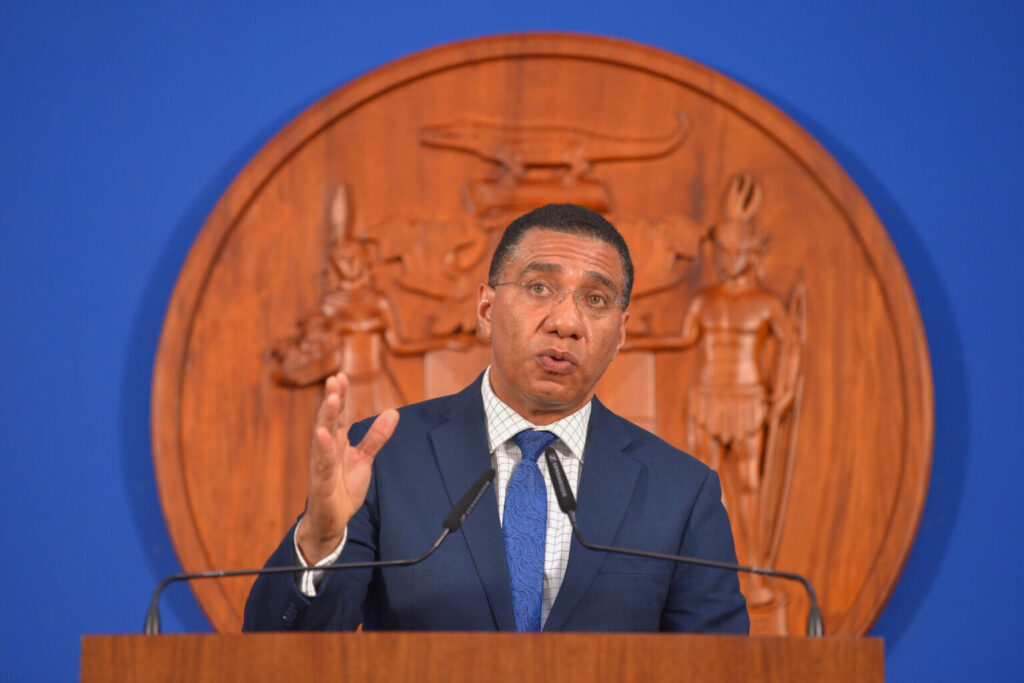Prime Minister Holness Highlights Government’s Strength and Disaster Preparedness After 5.6 Magnitude Earthquake Hit Jamaica

“We are very strong in terms of management, technical know-how, and experience. We are committed to ensuring that Jamaica is safe. From a fiscal perspective, we have put in place buffers to ensure that we are able to respond within the limits.”
——————————————————————-
– Prime Minister Holness
A meeting of the National Disaster Risk Management Council chaired by Prime Minister Andrew Holness was this morning convened, as the government assesses the effects of the 5.6 magnitude earthquake that shook the country on Monday (October 30, 2023).
The Council has reported that all government protocols and systems responded efficiently during and in the aftermath of the earthquake.
Prime Minister Holness said the response to yesterday’s event showed the government’s strength and the nation’s resilience to withstand such shocks.
The Prime Minister acknowledged that natural disasters can impact confidence and the outlook for the future and assured the public that Jamaica remains a strong and resilient country.
“I know these disasters can have an impact on confidence and how we view the future, but your government is strong. Our public response is strong, and we are a resilient country. So, let’s get back to work, mindful that disasters do happen, and we have to be prepared for them,” Prime Minister Holness stated.
Some 50 aftershocks have been recorded since the earthquake yesterday.
The following is a brief report based on the assessment by the government and various agencies:
Minister of Local Government’s Report:
Reports were given on the response operations of the Office of Disaster Preparedness and Emergency Management (ODPEM) and the Jamaica Fire Brigade. The Minister of Local Government and Rural Development, Hon. Desmond McKenzie, highlighted that immediate activation of the response mechanism took place and thorough assessments were carried out across the country. Fortunately, reports indicate that there was no significant damage to infrastructure or serious dislocation. Measures were taken to ensure the safety of infirmaries, and the public was reminded of earthquake preparedness protocols.
“The Office of Disaster Preparedness and Emergency Management (ODPEM) activated immediately its response mechanism in relation to the tremor that we experienced. The municipal corporations right around the country have been working along with the National Works Agency and other entities to assess the damage in various sections of the country. Particular interest is being placed on our infirmaries. So far, the reports that are coming suggest that everything is okay,” said Minister McKenzie.
Electricity and Utilities:
The Minister of Science, Energy, Telecommunications, and Transport, Hon. Daryl Vaz, reported on the status of critical utilities. He confirmed that the Jamaica Public Service had a brief period of load shedding following the earthquake but has since restored electricity to all areas. Both international airports and essential services, including PetroJam, are operating as usual, ensuring minimal disruption to daily activities.
Water Supply:
The Minister without Portfolio with Responsibility for Water, Hon. Matthew Samuda, assessed the water supply systems, consisting of over 750 pump stations, and reported no major damage to the infrastructure. While some areas may experience minor pipe breaks in the coming days due to seismic activity, no major disruptions are expected.
Road Infrastructure and Building Assessments:
The Chief Executive Officer at the National Works Agency (NWA), E.G. Hunter, provided an assessment of road infrastructure, bridges, and government buildings. Fortunately, the majority of buildings and infrastructure remain unharmed. Landslides have occurred in the eastern part of the country, especially in Portland, St. Mary, and St. Ann, but are being addressed by local teams. Notable government buildings, including the Office of the Prime Minister and the Ministry of Finance, were assessed. Some minor structural issues at the Ministry of Finance were identified, and measures are being taken to ensure safety.
Human Impact and Healthcare:
The Minister of Health and Wellness, Hon. Dr. Christopher Tufton, discussed the human impact of the earthquake. While some children exhibited anxiety, especially those in the affected areas, no serious injuries were reported. Hospitals and healthcare facilities have been functioning effectively, attending to trauma cases and anxiety-related symptoms. Additionally, the government has urged the public to monitor their mental health and seek assistance if required.
From a fiscal perspective, Prime Minister Holness noted that the government had instituted fiscal buffers to ensure a capable response within their means. As these fiscal buffers grow stronger and the economy thrives, they plan to further invest in equipment and technology to enhance resilience. The Prime Minister further underscored that the most significant investment is in improving building codes, urging Jamaicans to adhere to these codes as they play a pivotal role in bolstering the country’s ability to withstand natural disasters.
In conclusion, Prime Minister Holness reassured the nation that the government is prepared, and the public response mechanism is strong. He emphasized the need for resilience and preparedness in the face of natural disasters. He urged the public to ignore misinformation and rely on official sources for accurate information. Lastly, he called for parents and teachers to have conversations with children about earthquake preparedness.
The Prime Minister’s strong and comprehensive response, combined with the commitment of government agencies, is a testament to Jamaica’s resilience in the face of natural disasters. The nation is encouraged to return to normalcy with a heightened sense of preparedness.